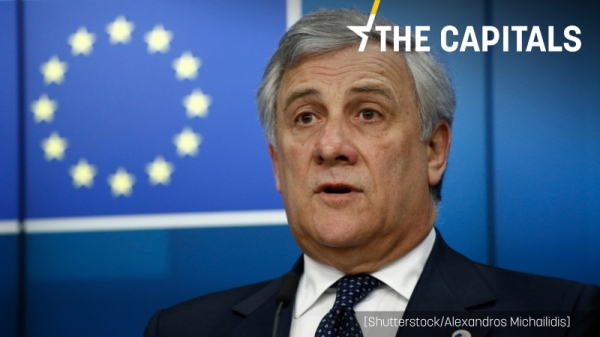EXCLUSIVE: Italian FM says EPP-ECR dialogue should continue after EU elections

The dialogue between the centre-right European People’s Party (EPP) and the European Conservatives and Reformists (ECR) should continue in the hopes of forming a solid majority to govern the EU after the 2024 European Elections, Italian Deputy Prime Minister and Foreign Affairs Minister Antonio Tajani told EURACTIV Italy in an exclusive interview.
Meanwhile, in light of projections that ECR will be the third political group in the next EU Parliament, liberal Renew Europe rules out any collaboration with right-wing “extremes”, making the puzzle of the next EU House more complex.
Together with Matteo Salvini’s far-right Lega (ID), Tajani’s Forza Italia (EPP) party is a member of the Italian coalition government led by Prime Minister Giorgia Meloni’s Brothers of Italy (ECR).
Forza Italia politicians often stress that their participation in the right-wing government guarantees the country’s pro-EU orientation considering the ambiguous European credentials of the other two coalition partners.
Asked if a “clear” pro-EU stance of the Italian coalition could be the premise for a European agreement between EPP and ECR and if he foresees Meloni’s Brothers of Italy joining the EPP in the future, Tajani replied:
“Next year there will be European elections, the EPP will have the duty to work to build a solid majority that can govern the European Union for the next five years […] It is important that the dialogue between ECR and EPP goes on. Although they are different forces, they already often vote together in the European Parliament,” Tajani said.
“And, for example, in 2017, it was precisely a majority of the EPP, ECR and Liberals that determined my election as President of the European Parliament,” he added.
An EPP-ECR collaboration is strongly supported by current EU centre-right leader Manfred Weber although his ambitions have so far received an enormous backlash in Berlin, where right-wing parties have firmly rejected it.
Read more: German centre-right blows off Weber-Meloni EU plans
Renew Europe distances itself from right-wing ‘extremes’
The third possible coalition partner in Tajani’s mind is centrist Renew Europe. However, a recent internal agreement in the group makes things complicated.
Notably, the parties belonging to the Renew Europe group in the European Parliament have signed a Memorandum of Understanding (MoU) to create a common electoral platform with shared candidates.
Renew Europe brings together the European Democratic Party (EDP), ALDE Party and Emmanuel Macron’s party Renaissance, counting to date 101 MEPs.
“This MoU is a useful step forward given the upcoming European elections as it will create an operational basis on which we can rely for the election campaign”, said Sandro Gozi, EDP secretary general.
In addition to Gozi, Renew Europe president and Renaissance secretary general Stéphane Séjourné and ALDE co-presidents Timmy Dooley and Ilhan Kyuchyuk signed the document.
Renew clarified that it excludes any alliance with those who have to do with the “extremes” – referring to Identity and Democracy (ID) and ECR.
“We say a loud and clear no to this hypothesis. We have already put it in writing, it is a strong political commitment, and we will reiterate it throughout our election campaign: we have another vision of Europe”, he noted, calling Meloni “neo-nationalist”.
The Socialists and Democrats (S&D) already took the same line, ruling out collaboration with the EPP for the same reason, despite their past understanding. The EPP is heading in “a very dangerous direction: the extreme right”, S&D president Iratxe García recently told EURACTIV Poland.
The EPP reacted strongly to the interview, lashing out against García.
“I understand that she is trying to hide the weaknesses of the S&D cooperating every day with extreme left forces which systematically defend Moscow and Beijing political positions and that is openly anti-European,” EPP press chief Pedro Lopez told EURACTIV Poland.
Tajani backs qualified majority, Treaty reform
At the EU policy level, Tajani talked negatively about the unanimity needed for current EU decision-making procedures, saying it has proven to have limitations and is often the cause of inefficiency and immobility.
“The Council would decide more nimbly and effectively with qualified majority voting in key areas such as taxation and foreign policy,” Tajani told EURACTIV Italy.
He also defended the more often use of instruments already provided for in the Treaties, such as ‘passerelle clauses’ (allows the alteration of a legislative procedure without a formal amendment of the treaties), to overcome possible deadlocks.
“Italy is ready to embrace targeted reform processes both of the institutional architecture and of the decision-making processes, in compliance with the principles of subsidiarity, transparency and timeliness that must always inspire our actions”, Tajani noted.
Regarding the much-discussed EU Treaty reform, he said it would be the way for Europe to “renew” and “relaunch” itself.
“There are reforms that can no longer be postponed, some of which can be undertaken even with the existing treaties, while others require amendments to them,” the Italian politician said, adding that the European Parliament should be granted the power of legislative initiative.
“It is therefore important to start the reform process. Whether by a Convention or with an Intergovernmental Conference, we will see,” Tajani concluded.
(Roberto Castaldi, Federica Pascale | EURACTIV.it, Sonia Otfinowska | EURACTIV Poland – Edited by Sarantis Michalopoulos | EURACTIV.com)
Read more with EURACTIV




